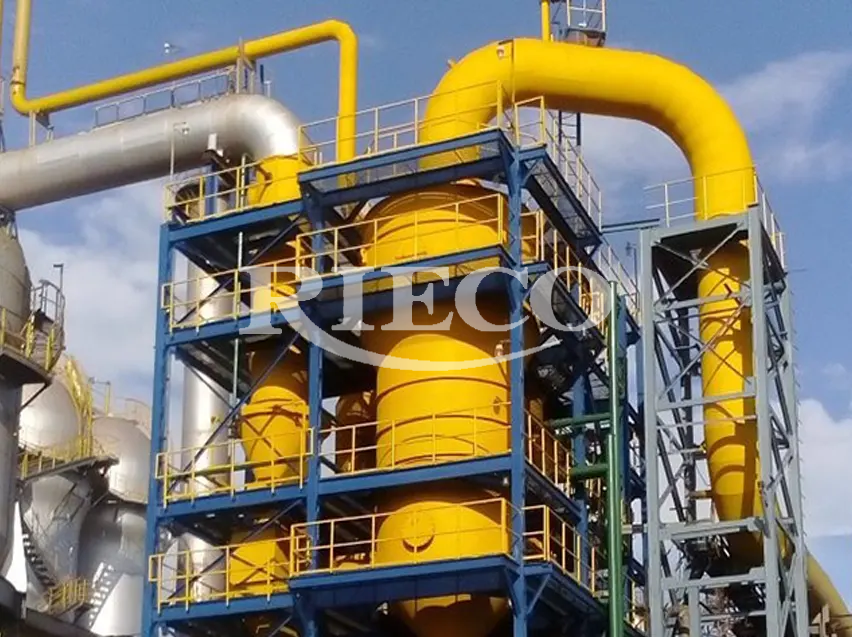Gas Cleaning Plants: How They Work and Their Role in Pollution Control

Gas Cleaning Plants
Introduction:
Industries hold crucial importance in economic development, but having a prominent presence comes with responsibility. Industrial practices significantly contribute to environmental pollution, causing concerning effects due to the emission of harmful gases. Dealing with harmful gases and interacting with the by-products of harmful substances or their remains cause a menace to the environment.
Incorporating a dependable and efficient solution like Gas Cleaning Plants (GCPs) helps reduce the ill effects of industrial operations. It works like an air pollution control device, making it the air purifier of industries. They help deal with toxic substances and control harmful gases efficiently. Integrating the system curbs pollution-related issues by following regulations and responsibility contributing to sustainable practices.
Let us learn more about it in detail:
What is a Gas Cleaning Plant?
Gas cleaning plants focuses on the major concern of the removal of pollutants from flue gases generated in different industrial applications. These plants are facilitated with a variety of processes and technologies to filter and treat gases, thus preventing the release of harmful substances directly into the atmosphere.
Gas cleaning plants in an industrial facility mitigate pollution issues, making it crucial in industries including power generation, cement manufacturing, metal processing, and chemical production. Thereby catering to industries that deal with large production of harmful gases causing severe harm to the environment.
Gas cleaning plants deal with different types of pollutants, including Particulate matter like
- Sulfur dioxide (SO2)
- Nitrogen oxides (NOx)
- Volatile organic compounds (VOCs)
- Heavy metals
The cleaning process follows a simple cycle consisting of pre-cleaning, scrubbing, and filtration operations using different equipment types like scrubbers, electrostatic precipitators, and cyclones.
How do they work?
Rieco’s Gas Cleaning Plants perform based on two stages of high energy venturi scrubbing system. Gases are cleaned in the first stage, followed by a thorough cleaning in the second stage. Both the stages together help eliminate 90-95% of dust particles.
Why Do You Need a Gas Cleaning Plant for Industrial Practice?
The need for gas-cleaning plants arises from the increasing importance of environmental responsibility during industrial practices. With stringent regulations set by governments that aim at reducing air pollution, industries must adopt measures to comply with these standards.
Gas cleaning plants serve multiple purposes:
- Protection with Effective Cleaning: Gas Cleaning Plants (GCP) effectively eliminate toxic industrial emissions containing hazardous substances like sulfur dioxide (SO₂), nitrogen oxides (NOₓ), and particulate matter, which can cause respiratory diseases and other health problems. Its multistage filtration guarantees more safety and quality outcomes. GCPs help minimize these health risks by effectively filtering out harmful pollutants. It is known to reduce dust content from gases below 5% mg/Nm3.
- Cost and Energy Efficiency: Modern GCP’s are integrated with the ability to reduce power consumption offering a lower operational cost. It is a crucial factor during industrial practice as it optimizes with a system that ensures optimized airflow management, waste heat recovery, and automated control systems that lead to low power consumption and minimal maintenance. The system is durable, ensuring long-term efficiency.
- Regulatory compliance: Following industrial standards and abiding by regulatory compliance, is crucial for industrial functioning. Governments worldwide impose strict emission control regulations on industries to curb air pollution. Adhering to the set standards safeguards the environment, and workers involved and helps avoid any potential legal issues and charging hefty penalties. It is equipped with a secure handling system that protects the environment by an eco-friendly operation.
Conclusion:
Air pollution control systems are the major implementation required for industries. A system that prevents the spread of harmful gases into the environment and minimizes air pollution is a must with the growth in industrial practices. The modern filtration and scrubbing technologies used in the cleaning plants work well to remove harmful elements and eliminate gas pollutants, thus serving the purpose of protecting human health and the environment. Additionally, gas cleaning systems promote sustainable operations by enabling the recovery of useful byproducts and improving energy efficiency.
With growing environmental concerns, industries have been encouraged to invest in gas cleaning technologies that have efficient environmental mitigation solutions. Through innovation and strong pollution control, gas cleaning plants will always remain pertinent on the road to cleaner and sustainable industrial practices.
To install a gas cleaning plant in your facility or for further details regarding installation, uses, and buying process contact us at:





